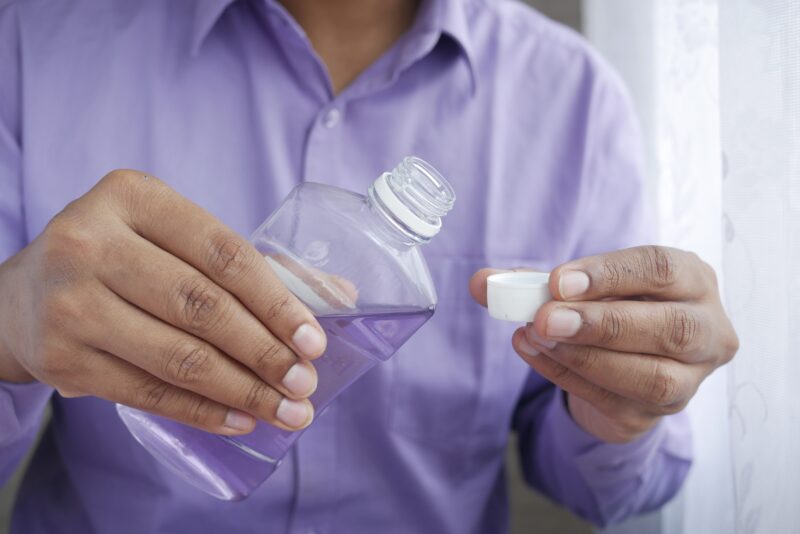Mouthwash is a part of many people’s daily dental routine, swishing around faithfully after brushing in the pursuit of a cleaner, fresher smile. Its minty swish is synonymous with a feeling of freshness and a defence against the invisible bacteria that threaten our oral well-being. However, amidst the bubbling froth of our rinsing routines, have you ever stopped to wonder if mouthwash is good for you?
What Does Mouthwash Do?
Mouthwash plays a rather dynamic role. It’s not always just about that cool splash of freshness. A proper swish and gargle can dislodge food particles, reduce bacterial load, and even fight against plaque build-up, depending on the type of mouthwash.
There are a number of different mouthwashes out there, each with their own unique qualities. Cosmetic mouthwashes are the popular choice for a quick fix of fresh breath, while therapeutic mouthwashes contain active ingredients targeting oral health conditions. Fluoride mouthwashes aim to bolster enamel and ward off decay, while antiseptic options contain chlorhexidine or cetylpyridinium chloride to significantly reduce bacterial populations.
Then there’s the natural brigade—mouthwashes without alcohol, made with ingredients like essential oils, which claim a more holistic approach. These may be less abrasive and are often preferred by those with sensitive mouths or aversions to strong flavours.
Mouthwash Benefits
The immediate perk of mouthwash is obvious: a sensation of minty freshness that can reinvigorate your oral cavity. But the real merits of mouthwash run deeper than the gust of cool air you exhale after each rinse.
Reduces Bacterial Load in the Mouth:
First and foremost, mouthwash helps to reduce bacterial load. It reaches the nooks and crannies that your toothbrush might not reach, removing germs and reducing the bacterial population that is instrumental in the formation of plaque—a sticky, colourless film of bacteria that envelops your teeth. Reducing bacteria can prevent plaque buildup, strengthen tooth enamel, and fight tooth decay.
Freshens Breath:
For those that struggle with halitosis, or chronic bad breath, a therapeutic mouthwash can be particularly beneficial. It’s not just masking odours; it’s often neutralising the sulphur-producing bacteria that are the true culprits behind the condition.
Reduces the Risk of Gum Disease:
For individuals with a propensity for cavities or gum disease, mouthwashes fortified with fluoride or antimicrobial agents can serve as a preventative arsenal, bolstering the defences laid down by brushing and flossing.
May Alleviate Dry Mouth:
People with xerostomia, also known as dry mouth, may find solace in specific mouthwash formulas designed to mimic saliva, aiding in moisture restoration and balance.
Assists in Reducing Oral Lesions and Canker Sores:
When your mouth is trying to heal from ulcers, lesions, or canker sores, a gentle mouthwash can provide a soothing cleanse that’s less abrasive than the bristles of a toothbrush. It cleanses the affected area, easing discomfort, and promoting quicker healing.
Drawbacks of Mouthwash
While mouthwash offers a number of benefits towards a person’s oral health, it’s important to acknowledge some of its possible drawbacks.
One of the lesser-known consequences of mouthwash use is the potential to disrupt the delicate balance of the oral microbiome. The mouth is a complex ecosystem, home to a variety of bacteria, some detrimental but many beneficial. An overly zealous use of mouthwash, particularly those with high alcohol content or strong antimicrobial properties, can sometimes cause an imbalance in the good bacteria.
Another aspect to consider is the irritation factor. Mouthwashes with high alcohol concentrations can sometimes cause a burning sensation and dry mouth symptoms. This is particularly common for individuals with sensitive gums or oral tissues.
There are also instances where the use of mouthwash might not be recommended at all, such as immediately after certain dental procedures, or for individuals who might inadvertently swallow the rinse, like young children or those with certain medical conditions.
These drawbacks can often be avoided with the proper use of mouthwash.
The Bottom Line
The right mouthwash, alongside your regular brushing and flossing, offers a number of oral health benefits and is good for you.
If you’re wondering whether mouthwash should become a part of your dental routine, or which type of mouthwash is best for you, contact us at Dentistry on Coolum to schedule a consultation. Our door is always open for a chat to ensure that your smile remains bright, healthy, and confident.


